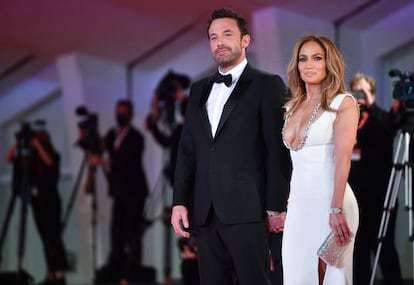Jennifer, Ben and last names: Can the woman/brand become ‘Mrs. Affleck’?
The wedding of the year gave rise to some questions, such as the possibility of Ben Affleck becoming Ben Lopez and the unlikely idea of Jennifer Lopez, the product, morphing into Jennifer Affleck, the wife

After 18 years of waiting, wedding bells finally rang. Jennifer Lopez, 52, and Ben Affleck, 49—one of the most fascinating and media-friendly couples of the early 2000s and one of the most hopeful surprise couples after the hard pandemic years—got married last weekend in Las Vegas. It was the perfect ending for a romantic comedy about re-encounters and second chances, the kind of movie that would star someone like Jennifer Lopez. After the flowers and champagne, and a selfie of J.Lo lying in bed the next morning, looking satisfied and happy with her new life, Jennifer Lopez shared the details of her wedding in her newsletter On The J.Lo.
Instead of the huge wedding they had planned in 2003 that never happened, the couple went for something quick, simple and intimate this time: “Stick around long enough and maybe you’ll find the best moment of your life in a drive through in Las Vegas at twelve thirty in the morning in the tunnel of love drive-through, with your kids and the one you’ll spend forever with. Love is a great thing, maybe the best of things-and worth waiting for.” Beyond describing the guest list and the dresses the singer chose for the occasion, the letter ended with a last curious detail, a new identity. She signed her newsletter “With love, Mrs. Jennifer Lynn Affleck.”
According to People magazine, which accessed the pair’s marriage license from the Clark County Clerk’s Office in Nevada, the name Benjamin Geza Affleck appears registered as Party 1 and Jennifer Lopez is listed as Party 2; however, in the “new name” section, the singer appears as Jennifer Affleck. This decision has received some criticism, especially on social media. As some have pointed out, it is a strange decision for someone like Jennifer Lopez, whose name is itself a personal brand that the artist has not hesitated to redefine at various stages, from Jenny From The Block to the unmistakable J.Lo, and who in recent years has been selling female empowerment and women’s individuality through songs like “Ain’t Your Mama.”
Despite the criticism, Jennifer Lopez made a very common decision: in the United States, around 70% of women still choose to take their husband’s last name after marriage, according to an investigation by The New York Times, one of the most extensive studies conducted in recent years. Although the number of women doing so has declined compared to previous generations, there is still a strong cultural tradition of women changing their last name, despite the fact that women are no longer penalized legally or financially for keeping their maiden names.
As journalist Sharon Brandwein explained in Brides magazine, the bible for brides-to-be in the United States, a woman taking her husband’s last name is a patriarchal tradition: “Under English common law, coverture asserted that once married, a woman’s identity was ‘covered’ by her husband. From the moment of her marriage, a woman was known as a ‘femme covert’ or covered woman; she and her husband essentially became one. With her identity essentially erased under the law of coverture, women could not own property or enter into contracts on their own. Husbands had complete control over their wives, legally and financially.”
Times have changed and the patriarchal tradition has now become a romance-based custom; it has the same symbolism as wearing something old, something borrowed, and something blue, or the bride being given away by her father at her wedding. According to a BBC report on the subject, there are two main reasons for keeping this tradition alive in the 21st century: “The first was the persistence of patriarchal power (whether that was obvious to the couples or not). The second was the ideal of the ‘good family’ – the sense that having the same name as your partner symbolizes commitment, and this ties you and any potential children together as a unit.”
She told you 20 years ago pic.twitter.com/PIMh2Zk8wl
— ⭐️ with a Y ⭐️ ☮️ (@wyntermitchell) July 17, 2022
Commitment and unity are exactly the two values that the name Jennifer Lynn Affleck conveys: a declaration of intent that ends the narrative that J.Lo herself has controlled since she got back together with Ben Affleck, whom she refers to as the love of her life. This time, however, Jennifer Lopez has taken charge of communicating information before the media does. The couple has pointed out in numerous interviews that they felt the press was the main cause of the breakup of their earlier relationship; the media hounded them constantly and the pair faced excessive scrutiny.
For the couple, the Affleck surname suggests that the fourth time is the charm: there is no clear record of whether J.Lo changed her last name in any of her three previous marriages. Without the newsletter, we don’t know whether she was Jennifer Noa, Jennifer Judd, or Jennifer Anthony at other times in her life. However, there is evidence from a 2003 video, shot as part of a special primetime interview with Access Hollywood about the media-friendly couple, which has resurfaced on social media. In it, J.Lo cooks an omelet as journalist Pat O’Brien asks what her name will be after she marries: “Jennifer Lopez,” she answers without skipping a beat, “but my name will be Jennifer Affleck, obviously.” Jennifer Lopez was separating her work as an artist—or rather, the J.Lo brand (the best-selling millionaire with her own skincare and perfume lines, among other things)—from her life as a wife. Jennifer Lopez will continue to be a singer, actress and dancer on stage, in front of the cameras, on the red carpet, and at awards shows, but in private she will be Jennifer Affleck, lovingly protecting that small part of the relationship that almost ended because of overexposure in 2003.
The very scrutiny Lopez’s latest newsletter signoff has received is also tinged with misogyny: few have pondered Ben Affleck’s decision to keep his own last name, as if the possibility of a Ben Lopez or B.Lo were unimaginable. It is still unusual for men to take their wives’ last names. But Jennifer Lopez and Ben Affleck could be that rare case. After all, they are already an exception: a couple who, after an 18-year separation that included several marriages (some of which were even happy) in between, got back together as more mature, wiser people to try again. And it works.
The possibility of Ben Lopez would be a twist on patriarchal tradition. As Álex Grijelmo has pointed out in a recent column aptly entitled, “Women Stripped of Their Last Name,” just because a tradition is widespread does not mean that it is not divisive: “Machismo is not located in the language system, then, because casuistry can overtake any theory; rather, misogyny resides in the asymmetries of how we use language. One such asymmetry is a woman’s loss of her last name; she is stripped of her identity and given her husband’s.” Jennifer Lynn Affleck is free to choose her identity. Ben Affleck would be too. Their story has had a happy ending, but perhaps it’s missing one last surprise.
Tu suscripción se está usando en otro dispositivo
¿Quieres añadir otro usuario a tu suscripción?
Si continúas leyendo en este dispositivo, no se podrá leer en el otro.
FlechaTu suscripción se está usando en otro dispositivo y solo puedes acceder a EL PAÍS desde un dispositivo a la vez.
Si quieres compartir tu cuenta, cambia tu suscripción a la modalidad Premium, así podrás añadir otro usuario. Cada uno accederá con su propia cuenta de email, lo que os permitirá personalizar vuestra experiencia en EL PAÍS.
¿Tienes una suscripción de empresa? Accede aquí para contratar más cuentas.
En el caso de no saber quién está usando tu cuenta, te recomendamos cambiar tu contraseña aquí.
Si decides continuar compartiendo tu cuenta, este mensaje se mostrará en tu dispositivo y en el de la otra persona que está usando tu cuenta de forma indefinida, afectando a tu experiencia de lectura. Puedes consultar aquí los términos y condiciones de la suscripción digital.









































